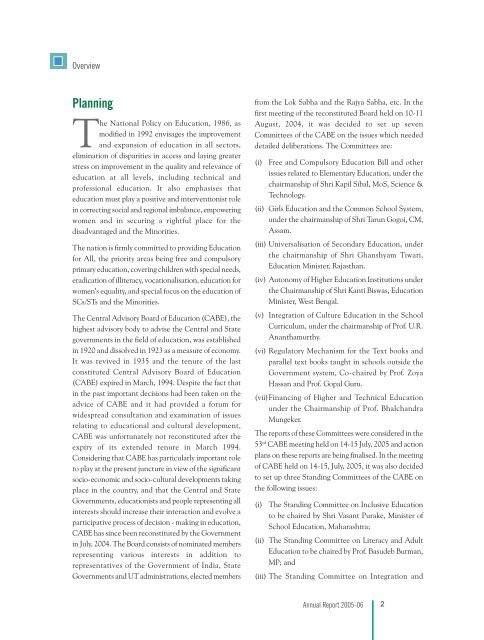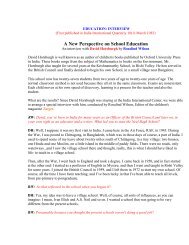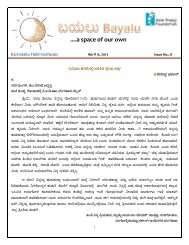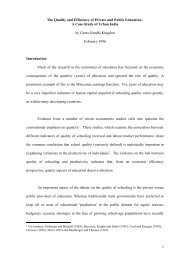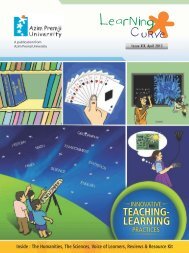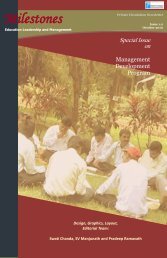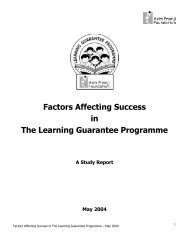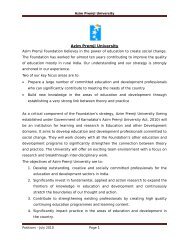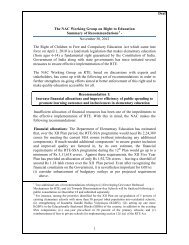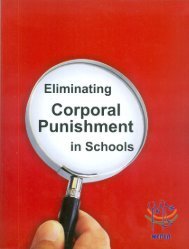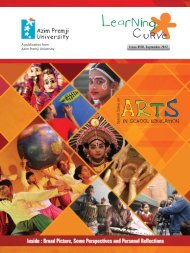all files - Azim Premji Foundation
all files - Azim Premji Foundation
all files - Azim Premji Foundation
Create successful ePaper yourself
Turn your PDF publications into a flip-book with our unique Google optimized e-Paper software.
Overview<br />
Planning<br />
The National Policy on Education, 1986, as<br />
modified in 1992 envisages the improvement<br />
and expansion of education in <strong>all</strong> sectors,<br />
elimination of disparities in access and laying greater<br />
stress on improvement in the quality and relevance of<br />
education at <strong>all</strong> levels, including technical and<br />
professional education. It also emphasises that<br />
education must play a positive and interventionist role<br />
in correcting social and regional imbalance, empowering<br />
women and in securing a rightful place for the<br />
disadvantaged and the Minorities.<br />
The nation is firmly committed to providing Education<br />
for All, the priority areas being free and compulsory<br />
primary education, covering children with special needs,<br />
eradication of illiteracy, vocationalisation, education for<br />
women’s equality, and special focus on the education of<br />
SCs/STs and the Minorities.<br />
The Central Advisory Board of Education (CABE), the<br />
highest advisory body to advise the Central and State<br />
governments in the field of education, was established<br />
in 1920 and dissolved in 1923 as a measure of economy.<br />
It was revived in 1935 and the tenure of the last<br />
constituted Central Advisory Board of Education<br />
(CABE) expired in March, 1994. Despite the fact that<br />
in the past important decisions had been taken on the<br />
advice of CABE and it had provided a forum for<br />
widespread consultation and examination of issues<br />
relating to educational and cultural development,<br />
CABE was unfortunately not reconstituted after the<br />
expiry of its extended tenure in March 1994.<br />
Considering that CABE has particularly important role<br />
to play at the present juncture in view of the significant<br />
socio-economic and socio-cultural developments taking<br />
place in the country, and that the Central and State<br />
Governments, educationists and people representing <strong>all</strong><br />
interests should increase their interaction and evolve a<br />
participative process of decision - making in education,<br />
CABE has since been reconstituted by the Government<br />
in July, 2004. The Board consists of nominated members<br />
representing various interests in addition to<br />
representatives of the Government of India, State<br />
Governments and UT administrations, elected members<br />
from the Lok Sabha and the Rajya Sabha, etc. In the<br />
first meeting of the reconstituted Board held on 10-11<br />
August, 2004, it was decided to set up seven<br />
Committees of the CABE on the issues which needed<br />
detailed deliberations. The Committees are:<br />
(i) Free and Compulsory Education Bill and other<br />
issues related to Elementary Education, under the<br />
chairmanship of Shri Kapil Sibal, MoS, Science &<br />
Technology.<br />
(ii) Girls Education and the Common School System,<br />
under the chairmanship of Shri Tarun Gogoi, CM,<br />
Assam.<br />
(iii) Universalisation of Secondary Education, under<br />
the chairmanship of Shri Ghanshyam Tiwari,<br />
Education Minister, Rajasthan.<br />
(iv) Autonomy of Higher Education Institutions under<br />
the Chairmanship of Shri Kanti Biswas, Education<br />
Minister, West Bengal.<br />
(v) Integration of Culture Education in the School<br />
Curriculum, under the chairmanship of Prof. U.R.<br />
Ananthamurthy.<br />
(vi) Regulatory Mechanism for the Text books and<br />
par<strong>all</strong>el text books taught in schools outside the<br />
Government system, Co-chaired by Prof. Zoya<br />
Hassan and Prof. Gopal Guru.<br />
(vii)Financing of Higher and Technical Education<br />
under the Chairmanship of Prof. Bhalchandra<br />
Mungeker.<br />
The reports of these Committees were considered in the<br />
53 rd CABE meeting held on 14-15 July, 2005 and action<br />
plans on these reports are being finalised. In the meeting<br />
of CABE held on 14-15, July, 2005, it was also decided<br />
to set up three Standing Committees of the CABE on<br />
the following issues:<br />
(i) The Standing Committee on Inclusive Education<br />
to be chaired by Shri Vasant Purake, Minister of<br />
School Education, Maharashtra;<br />
(ii) The Standing Committee on Literacy and Adult<br />
Education to be chaired by Prof. Basudeb Burman,<br />
MP; and<br />
(iii) The Standing Committee on Integration and<br />
Annual Report 2005-06<br />
2


